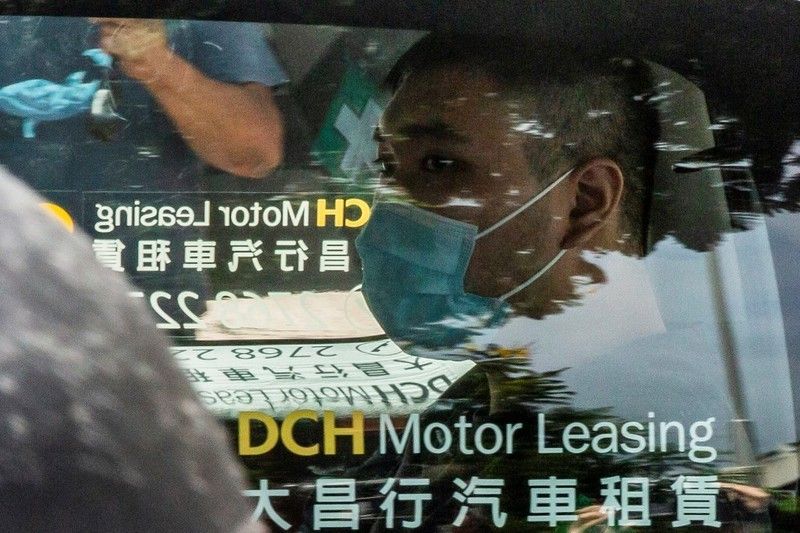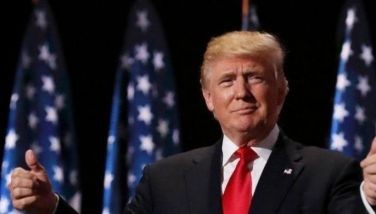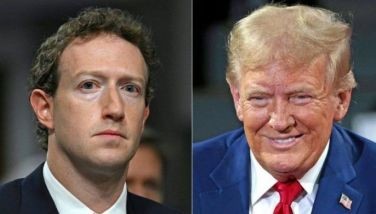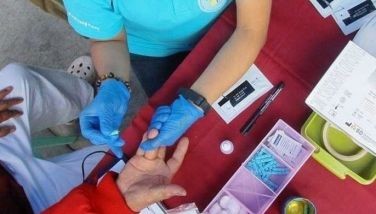Hong Kong court convicts man in first national security trial

HONG KONG, China -- A Hong Kong court convicted a former waiter of terrorism and inciting secession on Tuesday in the first trial conducted under a national security law that was imposed by China to stamp out dissent.
The watershed ruling lays down a new marker in the city's changing legal landscape and confirms that certain political slogans are now outlawed in the international finance hub.
Tong Ying-kit, 24, was charged with secession and terrorism after he drove a motorbike into three police officers while flying a protest flag during a rally on July 1 last year, the day after the national security law was enacted.
He will be sentenced at a later date, and faces up to life in prison.
The flag read "Liberate Hong Kong, revolution of our times", a ubiquitous slogan during the huge and often violent pro-democracy protests that convulsed the city two years ago.
The 15-day trial was heard without a jury -- in a significant departure from Hong Kong's common law tradition -- and was decided by three judges handpicked by the city's leader to try national security crimes.
In a written ruling, the judges said the flag's slogan was "capable of inciting others to commit secession".
The charge of terrorism was met, they added, because crashing his motorbike into police officers "seriously jeopardised public safety or security".
"Accordingly, we convict the defendant on both counts," judge Esther Toh said in court.
The verdict will now give clues to both prosecutors and defence lawyers as to how Hong Kong's judiciary plans to interpret Beijing's broadly worded security law and whether the semi-autonomous city's courts will become more like those in authoritarian mainland China.
More than 60 people have been charged under the law, including some of the city's best-known democracy activists such as Jimmy Lai, owner of the now-shuttered Apple Daily newspaper.
Most of those charged are now in jail awaiting trial.
Slogan now illegal?
Days of Tong's trial were spent on the flag, with university professors called by both sides to explain the slogan's meaning.
Defence experts argued the slogan meant many things to different people in what was a leaderless protest movement that included a broad spectrum of political views, from people advocating genuine independence from China to those wanting greater democracy and police accountability.
"It is actually quite difficult, quite traumatic or even misleading to think that one idea only means one thing in my mind in all circumstances," said Francis Lee, Chinese University of Hong Kong's journalism school head, who was called as a defence witness.
The prosecution argued that Tong was pursuing a "political agenda" that caused "great harm to society" and therefore met the bar for terrorism.
They argued that the flag and slogan had clear separatist connotations.
Ultimately judges sided with the prosecution in a ruling that will have major ramifications for others who have been charged for either displaying or shouting the same slogan.
Tong's case was unusual in that he is one of the only people arrested under the security law who was accused of an explicitly violent act.
The vast majority of those charged under the security law were arrested for expressing political views that authorities say are now illegal.
Democracy activists and many Western nations say the security law is reshaping Hong Kong in China's authoritarian image.
China says it was needed to restore stability after 2019's protests.
In mainland China, opaque courts answer to the Communist Party and conviction is all but guaranteed, especially in political or national security cases.
Hong Kong maintains an internationally respected common law system that is the bedrock of its business-hub status.
But the security law has radically transformed the political and legal landscape of the city, which China promised could keep key liberties and autonomy after its 1997 return from British colonial rule.
China has jurisdiction over some cases and has allowed its security agents to operate openly in Hong Kong for the first time.
It also allows for cases to be tried by judges instead of juries and bail is largely denied for those arrested.
The city's justice secretary invoked the no-jury clause for Tong's trial, arguing that juror safety could be compromised in Hong Kong's febrile political landscape.
Tong pleaded not guilty to all charges and did not take the stand during the trial.
-- Yan Zhao and Louise Delmotte
- Latest
- Trending






























